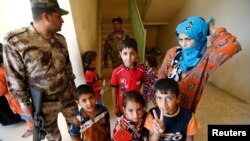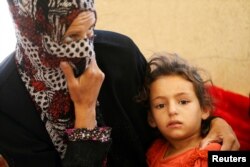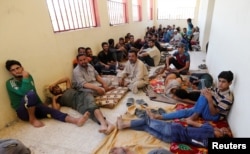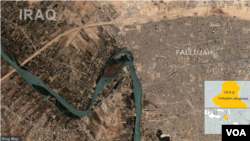Some 20,000 children are believed to be trapped in Fallujah, Iraq as fighting rages for control of the city that Islamic State militants seized more than two years ago.
Since the Iraqi military operation began for Fallujah, 60 kilometers west of Baghdad, "very few families have been able to leave; most have moved to two camps while others have sought refuge with relatives and extended families," according to the U.N. Children's Fund. The U.N. agency also warns that children face the risk of forced recruitment into the fighting and separation from their families.
Nearly 3,700 people, or 624 families, have managed to escape the fighting in Fallujah - a traditionally Sunni stronghold - since last week, said the U.N. There are fears that the thousands of civilians who remain trapped could be used as human shields by IS. Humanitarian agencies say those who have managed to escape describe a deteriorating situation where food and medicines are in short supply and the water unsafe for drinking.
Dressed in the black uniform of the Iraqi counterterrorism forces and flanked by Iraqi military commanders, Iraqi Prime Minister Haider al Abadi urged the country's armed forces to protect civilains as they fight to take the city.
Iraqi forces, including the army, counterterrorism units, special forces, local fighters and Hashd al Shaabi militias, have met with stiff IS resistance around the city.
"A human catastrophe is unfolding in Fallujah. Families are caught in the crossfire with no safe way out," said Jan Egeland, the secretary-general of the Norwegian Refugee Council. Egeland said he expects the situation to quickly worsen as summer approaches, with temperatures likely to hit or exceed 50 degrees Celsius.
Civilian men screened
Iraqi forces, meanwhile, are separating out and screening the men, concerned about the loyalties of those who are leaving the city after living under IS rule.
"Approximately 500 men and boys over 12 years old are held for security screening, which can take five to seven days," said UNHCR spokesman William Spindler. VOA spoke to one refugee, who gave his name as Ayad, about the process.
"They interviewed me, the Hashd al-Shaabi and the Iraqi army," he said, referring to the umbrella group of Shi'ite militias who work in parallel with the Iraqi military.
"They said if we find your name in our database, we will kill you. If you are in the clear, you can live with us in peace," Ayad said, as he spoke through an interpreter in a telephone interview.
Shi'ite presence
Hashd al-Shaabi has taken an important role in the fight against IS, and some see the pro-Iran militias as better trained than the Iraqi army. Others, however, are worried that a strong Shi'ite presence in the war against IS -- whose strongholds are in predominantly Sunni areas -- will only further aggravate the deep sectarian divisions that already exist in the country.
Many Sunnis in Baghdad say they live in fear of the Shi'ite militias, and human rights organizations have flagged abuses by the militias in the past.
Lawmaker and former national security adviser Mowaffaq al-Rubaie defended the Hashd's role in the fight against IS.
"I believe the Hashd al-Shaabi should have, and is having, a pivotal role in the liberation of our occupied territories," Rubaie told VOA.








